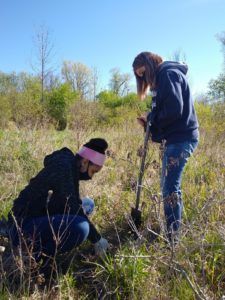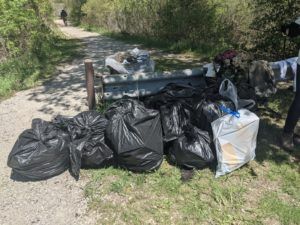On the Ground Junior: Eaton RESA at Lake Interstate SGA

Two Eaton RESA students plant one of 500 sargent crabapple seedlings within Lake Interstate SGA.
On Wednesday, May 12, a group of 24 students from Eaton Regional Education Service Agency (RESA) volunteered for wildlife at Lake Interstate State Game Area with Michigan United Conservation Clubs’ (MUCC) On the Ground Junior (OTG Jr.) program. The students were tasked with a variety of wildlife habitat improvement and user-access improvement projects throughout the day.
The students began the day by planting 500 sargent crabapple seedlings in two openings within the state game area. Students learned how to properly plant bare-root seedlings, and they also took part in a discussion about why soft mast-producing species like crabapples are so beneficial to wildlife for the food and cover they provide as they mature.
Following the tree planting, students moved on to an extensive trash pick-up effort that spanned from the entrance of the state game area to many of the trails around Lake Interstate. Many small items like cigarette butts, fishing lines, drinking containers and food wrappers were removed from the area, as well as larger items like discarded metal bins, plastic outdoor decorations, and clothing items. Students were alarmed at the extensive amount of trash that had accumulated in the shrubs, trees and understory of different portions of the state game area, and learned first-hand why it is so important to properly dispose of one’s waste and not discard it on public land.

A collection of the some of the trash students picked up within the Lake Interstate SGA.
Finally, the students spent the last portion of the day improving user access to the lake and other trails by pruning vegetation that was encroaching along the pathways. Students stacked the brush to the side of the trail upon removing it, and were careful not to disturb any nesting birds or other wildlife during the pruning process. While walking the trails, students observed migrating warblers and other songbirds, chewed trees as evidence of beavers within the area and an abundance of other natural observations that helped them grow as new environmental stewards.
At the end of the day, students received OTG t-shirts and an OTG sticker for their hard work.
The work completed on this piece of public land will benefit wildlife and recreationists alike. We would like to thank the students and staff at Eaton RESA that attended this habitat day at Lake Interstate State Game Area.
To learn more about MUCC’s OTG program, please visit mucc.org/on-the-ground or follow us on Facebook at facebook.com/muccotg .
The post On the Ground Junior: Eaton RESA at Lake Interstate SGA appeared first on Michigan United Conservation Clubs.
Recent Posts



